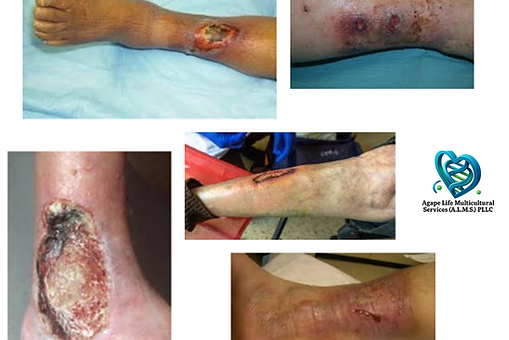Mobile Wound Care for People with Arterial Ulcers
Advanced Treatment for Slow-Healing & Circulation-Related Wounds.
Serving patients in Texas, Arizona, Louisiana, Tennessee, Arkansas & Colorado
Arterial ulcers require specialized wound care because poor circulation prevents oxygen and nutrients from reaching the tissue. Without timely treatment, these wounds can progress quickly leading to infection, hospitalization or even amputation.
ALMSPllc provides hospital-grade arterial ulcer care right at home or inside your facility.
What Are Arterial Ulcers?
Arterial ulcers are painful, slow-healing wounds caused by restricted blood flow, most commonly due to Peripheral Artery Disease (PAD). These ulcers typically form on the toes, feet, heels or ankles and worsen when oxygen-rich blood cannot reach the skin.
Residents in Skilled Nursing Facilities, Assisted Living, Long-Term Care, Rehabilitation Centers and patients receiving home care are at higher risk if they have:
-
Diabetes
-
PAD or other vascular diseases
-
Limited mobility
-
History of smoking
-
Heart disease or high blood pressure
Because these wounds do not heal on their own, early professional intervention is essential.
Why Treatment Matters

Arterial ulcers create serious clinical, safety and compliance concerns for both facilities and home-based patients.
Without prompt, skilled wound care, arterial ulcers can lead to:
-
Severe infections and emergency hospital transfers
-
Gangrene and preventable amputations
-
Intense pain and loss of mobility
-
Lower quality of life
-
Costly survey citations and liability issues for facilities
For home patients, untreated arterial ulcers often result in repeated ER visits and weeks or months of delayed healing.
Early, structured wound care reduces complications, speeds recovery and helps keep patients where they want to be, safe at home or in their facility.
Signs & Symptoms of Arterial Ulcers
Watch for early warning signs:
-
Painful sores on toes, heels or ankles
-
Punched-out, round wounds with sharply defined edges
-
Cool, pale or bluish skin around the ulcer
-
Sharp or burning pain, especially when the leg is elevated
-
Blackened or dead tissue (necrosis)
-
Little to no bleeding

Early detection is the key to preventing rapid decline. Staff and caregivers should be trained to recognize these symptoms immediately.

How We Help
Agape Life Multicultural Services (ALMSPllc) provides expert mobile wound care for arterial ulcers delivered directly to patients in Texas, Arizona, Louisiana, Tennessee, Arkansas and Colorado. Our board-certified wound care clinicians use evidence-based approaches to improve healing, reduce hospitalization risk and enhance overall safety.
For Facilities (SNF, ALF, LTC, Rehab):
We help your team stay compliant, proactive, and patient-focused with:
-
Weekly wound rounds for early detection
-
Evidence-based treatment plans designed for arterial wounds
-
CMS-ready documentation to support regulatory compliance
-
Staff education on prevention, monitoring & early identification
-
Coordination with PCPs, vascular specialists & administrators
This reduces avoidable hospitalizations, infection rates and survey risks.
For in-home patients, we deliver:
We bring expert wound care directly to your doorstep:
-
On-site wound assessments & treatments
-
Customized plans addressing circulation and wound healing
-
Family education for better daily monitoring
-
Coordination with your primary provider and specialists
-
All with Medicare Part B coverage and complete clinical documentation.
